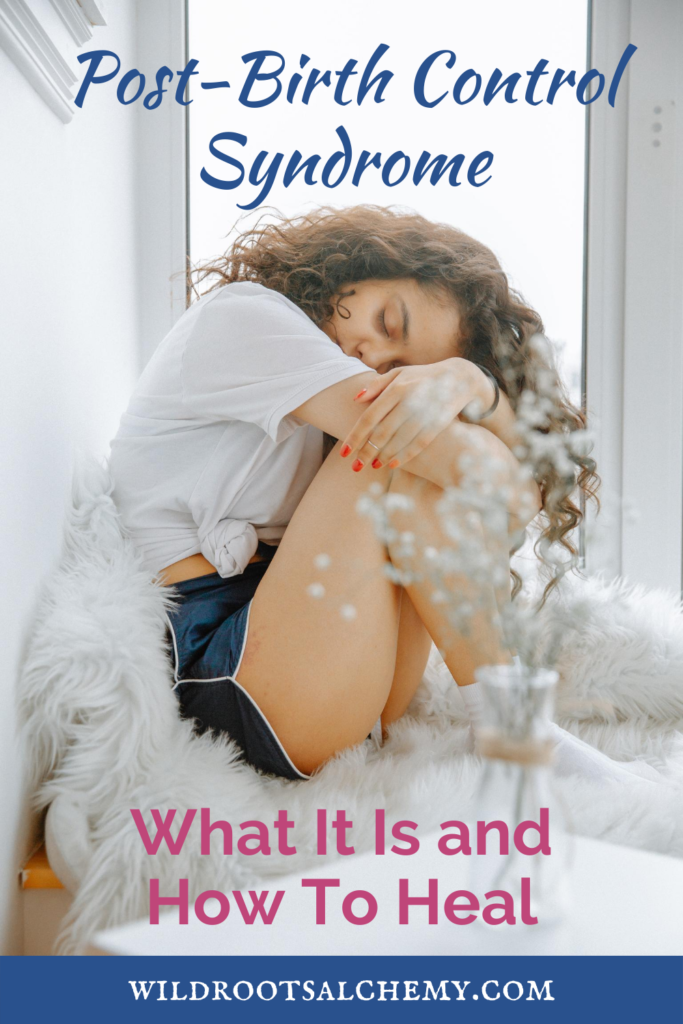
I was on the birth control pill for seven years. When I wanted to stop taking it, I thought my body would just “return to normal,” and that maybe I’d even feel better after experiencing years of pill-induced mood swings and weight gain.
Yet my period didn’t return after stopping the pill, and it didn’t come back for 2 years. About 3 months after stopping the pill, I also broke out in severe acne when I’d hardly had more than a pimple here and there in my entire life!
What is Post-Birth Control Syndrome?
The term “Post-Birth Control Syndrome” has been used by many medical professionals to refer to the group of symptoms that pop up after discontinuing hormonal birth control.
Hormonal birth control is intended to suppress your hormone production, shutting down communication between your brain and your reproductive system, halting ovulation. When you stop birth control, your body has to figure out how to get your brain and your ovaries to start communicating again! This is where post-birth control symptoms come in.
Post-birth control symptoms typically develop about 3-6 months after stopping birth control. A majority of women who stop birth control will experience some symptoms.
These are some of the most common post-birth control symptoms:
- Amenorrhea (absent menses)
- Severe, cystic acne
- Chronic or recurrent vaginal infections urinary tract infections (UTIs)
- Mood swings, anxiety
- Hair loss
- Heavy, painful periods
- Irritable bowel syndrome (IBS)
- Blood sugar dysregulation
- Hypothyroidism
- Chronic inflammation and autoimmune disease
- Headaches
How to Heal from Post-Birth Control Syndrome
Hormonal birth control is a huge stressor for your body. After being on birth control, your body needs to heal itself. It will take some time for your body and your hormones to restore balance, but luckily there is a lot that you can do to support your body in its healing process.
1. Detox from the synthetic estrogens found in birth control (and stored in your body’s fat cells!)
The liver is responsible for metabolizing and detoxifying your hormones, including the synthetic hormones found in birth control. Birth control puts such a burden on your liver, since it has to work through those hormones every single day while you’re on it. Then when you stop, it takes quite awhile for your body to fully detoxify from all the excess hormones stored in your fat cells, especially with sluggish liver function resulting from years of being on synthetic hormones.
So focus on the liver! Eat foods that love your liver and promote healthy detoxification: beets, broccoli, kale, lemon juice, dandelion root and leaves, and burdock root. This will help your liver process extra estrogen more efficiently, clearing it out of your body.
You also want to free up the hormones stored away in your fat cells. Mobilize the excess hormones by moving and sweating. Exercise to the point where you work up a sweat, and consider using a sauna.
I’m not a huge fan of supplements, but supplementing key nutrients for a short period of time can be useful when you’re coming off birth control. B vitamins and trace minerals are needed for optimal metabolism and detoxification. Consider taking a B-complex and adding trace mineral drops to your water daily.
Depending on what your symptoms are, there could be a number of different organ systems within your body contributing to poor metabolism and detoxification. It’s important to check with a naturopathic doctor to determine how to properly address your unique symptoms.
2. Daily bowel movements are a must!
Once estrogen has been metabolized in the liver, it is either sent to your kidneys to be urinated out or your intestines to be secreted by your feces. If you’re constipated or not pooping regularly, the excess estrogens hanging out in your intestines can be reabsorbed, going back into circulation and putting more stress on your liver to re-metabolize those hormones.
There may be many reasons why you’re not having regular bowel movements, but here are some simple ways to help get you pooping:
- Drink more water (dry stools lead to constipation!)
- Drink warm water with a squeeze of lemon first thing in the morning on an empty stomach. This can help stimulate a bowel movement.
- Make sure you’re eating plenty of fibrous fruits and vegetables
- Massage your belly daily to promote gastrointestinal motility. Massage in a clockwise direction, ending with your last stroke downward on the left side of your abdomen.
3. Work on balancing ALL your hormones, not just estrogen
Birth control messes up the delicate balance of all of your hormones, including your sex hormones (estrogen, progesterone, and testosterone), thyroid hormone, cortisol (creating adrenal dysfunction), and insulin (creating blood sugar dysregulation).
While it’s important to focus on all of your hormones, perhaps the most important hormone to focus on at first is insulin. Birth control causes insulin resistance, promoting blood sugar dysregulation. Blood sugar issues then mess up your thyroid, cortisol levels, and sex hormones, including potentially triggering your ovaries to produce excess testosterone (which ups your skin’s sebum production, leading to acne).
Keep your blood sugar stable by eating a healthy diet and avoiding foods that spike blood sugar, like refined carbs and sweetened beverages. Let go of habits that wreak havoc on your blood sugar (like excess snacking and eating right before bed) and focus on habits that promote insulin sensitivity and stable blood sugar levels: regular movement, solid sleep, and healthy foods.
If you have healthy blood sugar levels, your adrenals, thyroid, and ovaries will thank you! It’s much easier for them to function optimally and have hormonal balance when your blood sugar is regulated.
4. Focus on your nervous system to heal your leaky gut
Birth control is known to cause intestinal hyperpermeability (a.k.a. leaky gut). This is when the lining of your gut becomes damaged, allowing food particles and other substances to leak through into your bloodstream, causing an immune reaction and leading to chronic inflammation.
First, identify and remove any triggering foods temporarily while your body heals. Common sensitivities are gluten, dairy, eggs, corn, and soy. Removing these foods is short-term: most people can add these foods back into their diet once their gut lining has been healed.
The most important piece of the puzzle when healing leaky gut is addressing the nervous system component. Your gastrointestinal system is filled with a huge supply of nerves called the enteric nervous system, which is regulated by the vagus nerve. The vagus nerve is controlled by the parasympathetic nervous system, which is responsible for your “rest and digest” functions.
To optimize digestion and healing of your gut, focus on therapies that stimulate your vagus nerve and the parasympathetic nervous system. Practice mindfulness while eating, as this helps put your body into a parasympathetic state. Bitter herbs can also be helpful for stimulating vagal tone.
Would You Like Support Healing After Birth Control?
I offer one-on-one virtual consultations to help get your hormones and your health back on track. Together we’ll uncover the root of your imbalances and come up with a holistic and natural approach that addresses you as a whole person.
Comment below with any questions!
Photo in featured image courtesy of Polina Zimmerman





